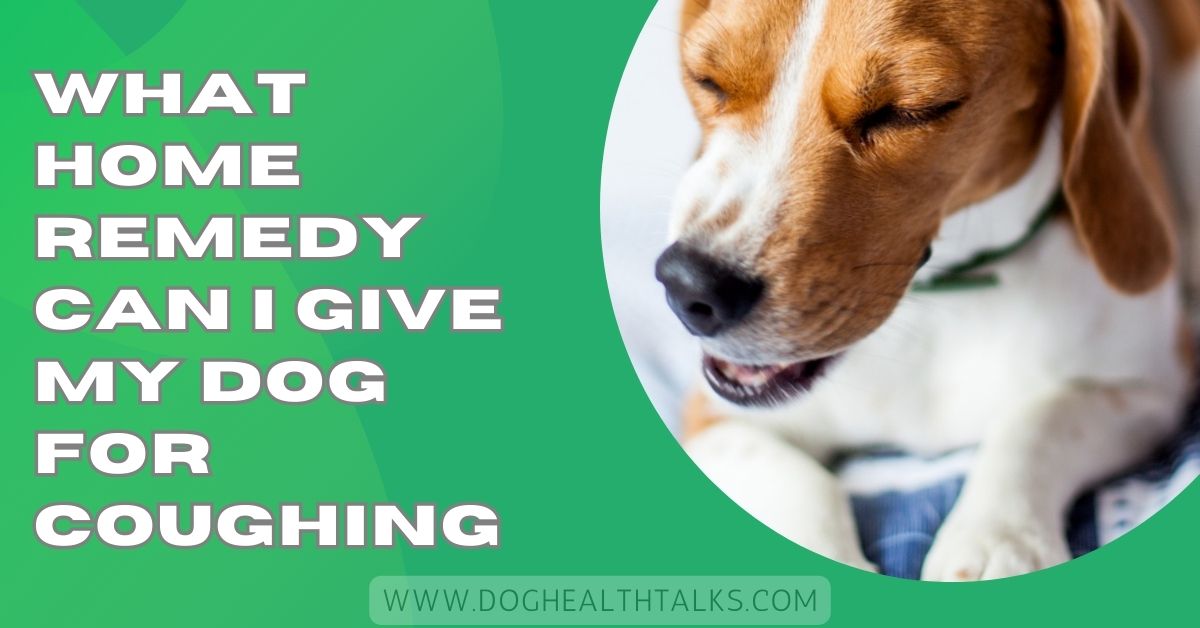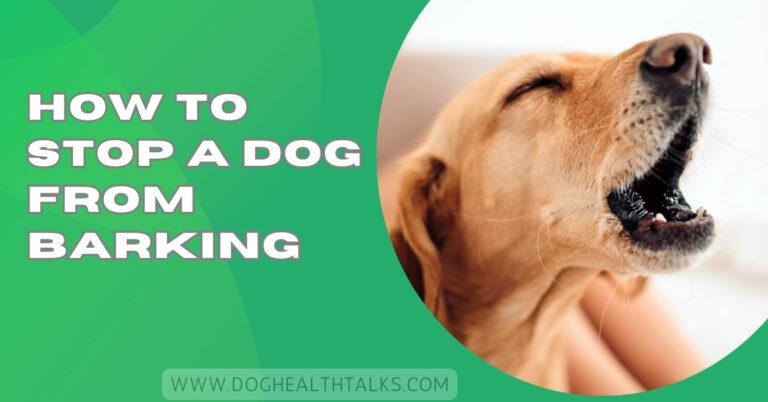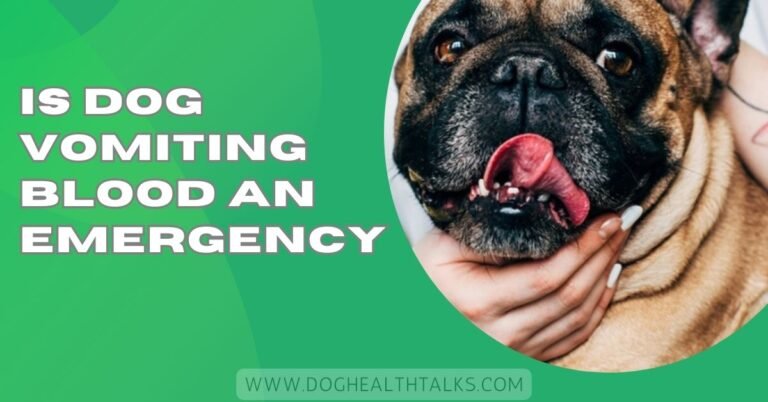What Home Remedy Can I Give My Dog For Coughing: Guide
Watching your dog start coughing can be worrying and even a little heartbreaking. Like us, dogs can catch a tickle in their throat or deal with something more serious.
You can soothe your dog’s cough with safe home remedies like honey, steam therapy, hydration, or warm chicken broth. Natural options like coconut oil or echinacea may help, but consult your vet first.
In this guide, you’ll learn safe, simple, and effective remedies you can try at home, plus when it’s time to call the vet for professional help.
Understanding Dog Coughing
Coughing in dogs is similar to coughing in humans — it’s the body’s way of clearing the throat or airways.
Sometimes it’s caused by simple things like dust, smoke, or pulling on the leash, while other times it may point to an illness such as kennel cough or heart disease.
Please consider how the cough sounds, how long it lasts, and whether your dog has other symptoms. These details help you know if trying home care or calling the vet is safe.
Why Is My Dog Coughing?

Dogs cough for many reasons, ranging from harmless irritation to health problems that need care. A short cough after excitement, exercise, or swallowing water usually isn’t serious.
But a dry, hacking, or ongoing cough could signal kennel cough, infections, or even heart issues. Your dog might also cough if something irritates their throat, like dust or allergies.
Understanding the “why” helps you decide what to do next — whether to keep them comfortable with safe home remedies or schedule a veterinary checkup.
1. Low-Risk Causes of Coughing in Dogs
- Occasional throat irritation from dust or smoke: Dogs can cough if they inhale dust, smoke, or other irritants. Usually, it’s short-lived and clears on its own once the air is cleaner and irritation stops.
- Coughing after drinking water too quickly: Sometimes, dogs gulp water too fast, and it “goes down the wrong way.” This causes brief coughing or gagging but usually stops quickly without lasting problems. It’s a harmless and common issue.
- Mild allergies that trigger sneezing and coughing: Seasonal pollen, mold, or household allergens can cause occasional coughing or sneezing. These mild reactions are uncomfortable but not dangerous. Keeping your dog’s environment clean often reduces these allergy-related coughs.
- Collar pressure or leash pulling: Tight collars or strong leash pulling can irritate a dog’s throat, leading to short coughing fits. Switching to a harness is a simple way to prevent this irritation and protect your dog’s airway.
- Short-term coughing after excitement or play: Excited or overactive dogs sometimes cough briefly due to heavy breathing. This isn’t usually a health concern and settles once your dog calms down and catches their breath again.
2. Potentially Serious Causes of Dry Heaving in Dogs
- Kennel cough or other respiratory infections: Kennel cough causes a dry, hacking cough that sounds harsh and persistent. It spreads easily between dogs and often needs veterinary care for proper recovery, especially in puppies or older dogs.
- Heart disease affecting the lungs: Some heart problems cause fluid buildup around the lungs, leading to coughing and dry heaving. This is serious and needs veterinary attention, as untreated heart disease can become life-threatening for your dog.
- Tracheal collapse in small breeds: Small dogs like Yorkies or Pomeranians can suffer. Their windpipe narrows, causing a honking cough and breathing issues. This condition requires vet guidance for proper management and treatment.
- Pneumonia or fluid in the lungs: Pneumonia makes dogs cough deeply and struggle to breathe. Fluid or infection in the lungs is painful and dangerous. Veterinary treatment, often with antibiotics and supportive care, is essential for recovery.
- Lungworms or other parasites: Parasites like lungworms can irritate the airways, causing coughing, wheezing, or dry heaving. They enter through infected animals, soil, or water. Regular parasite prevention and quick veterinary care help protect your dog.
Also Read: Dog Kidney Failure: When To Euthanize? A Vet’s Perspective
When to Try Home Remedies for Dog Coughing
Home remedies can be helpful when your dog has a mild, occasional cough but otherwise seems healthy and active.
If the cough is soft, short-lived, and not paired with fever, breathing trouble, or loss of appetite, safe at-home care like honey, hydration, or rest may ease discomfort.
However, if coughing is harsh, constant, or comes with other symptoms, skip home remedies and contact your vet. Always trust your instincts—professional care is the safest choice if you’re worried.
Top Home Remedies for Dog Cough

1. Hydration to Soothe the Throat
Keeping your dog well-hydrated helps moisten the throat, reduce irritation, and ease coughing. Fresh water, low-sodium broth, or ice cubes are simple, safe ways to keep them comfortable.
2. Honey as a Natural Cough Suppressant
A spoon of raw honey can coat your dog’s throat, reduce irritation, and calm mild coughing. Use in small amounts and avoid giving honey to puppies under one year.
3. Steam Therapy for Easy Breathing
Letting your dog sit in a steamy bathroom can loosen mucus, soothe irritated airways, and make breathing easier. Always supervise and ensure they’re comfortable with the warm environment.
4. Rest and Calm to Aid Healing
Quiet rest helps your dog’s body heal faster from coughing. Avoid heavy play or stress, provide a cozy space, and let them recover at their own pace.
5. Herbal Teas Safe for Dogs
Mild teas like chamomile or licorice root (cooled, unsweetened) can soothe the throat and reduce coughing. Always check with your vet first and avoid teas containing caffeine or additives.
10 Reasons Why Your Dog is Coughing
1. Kennel Cough
Kennel cough is a contagious infection that spreads quickly in shelters, parks, or boarding facilities. It causes a dry, hacking cough, sometimes sounding like gagging.
Most mild cases improve with rest and home care, but a veterinarian should always check puppies, seniors, or severe cases.
2. Chronic Bronchitis
Chronic bronchitis in dogs is long-term inflammation of the airways, often seen in older dogs. It causes persistent coughing and trouble breathing.
While it can’t be cured, symptoms can be managed with medications, lifestyle adjustments, and a smoke-free environment. Veterinary guidance ensures your dog stays comfortable and maintains good health.
3. Laryngitis
Laryngitis happens when a dog’s voice box becomes inflamed, often from excessive barking, irritants, or infections.
Symptoms include hoarseness, a raspy cough, or changes in barking sounds. Mild cases may improve with rest, but a vet should check ongoing irritation or breathing difficulty promptly to rule out complications.
4. Heart Disease
Heart disease can cause fluid buildup in a dog’s lungs, leading to frequent coughing, especially at night or after activity.
You may also notice tiredness or labored breathing. Because heart-related coughs signal serious health issues, seeing your vet quickly for diagnosis and treatment options to protect your dog is essential.
Read Also: How To Strengthen Dogs Nails – Easy Vet-Approved Tips!
5. Pneumonia
Pneumonia is a lung infection that makes breathing painful and difficult. Dogs may cough, breathe fast, show fatigue, or even have a fever.
It can develop from bacteria, viruses, or inhaling food or water. This condition is dangerous, so quick veterinary care is essential to prevent complications and help your dog recover safely.
6. Tracheal Collapse
Tracheal collapse is common in small breeds like Yorkies and Pomeranians. The weakened windpipe flattens, causing a harsh, honking cough, especially during excitement or exercise.
It’s a lifelong condition that needs careful management with weight control, medication, and sometimes surgery. A vet’s guidance ensures comfort and prevents worsening symptoms over time.
7. Lungworm Disease
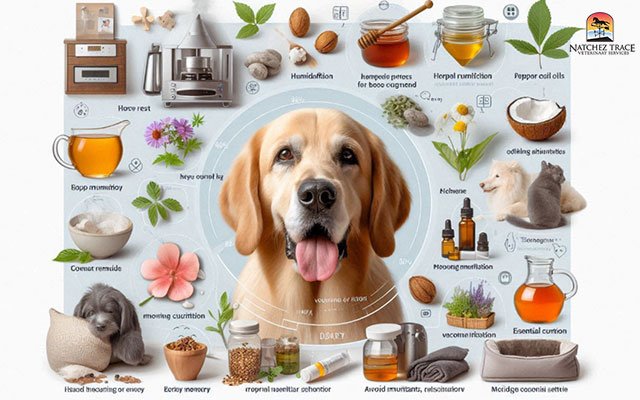
Lungworms are parasites that can infect dogs after they eat slugs, snails, or contaminated grass. They cause coughing, breathing difficulties, and general weakness.
Untreated, this disease can be life-threatening. If your dog shows these signs or spends time outdoors unsupervised, consult your vet immediately for proper testing, diagnosis, and treatment options.
8. Canine Influenza
Canine influenza, or dog flu, is a contagious viral infection that spreads through coughs, sneezes, or shared items like bowls and toys.
Symptoms include coughing, runny nose, fever, and tiredness. Most healthy dogs recover with supportive care, but puppies, seniors, or sick dogs need veterinary monitoring to avoid serious complications.
9. Irritants
Dogs often cough when exposed to smoke, dust, cleaning products, or pollen. These irritants inflame the airways and cause throat discomfort.
Keeping your home smoke-free, using pet-safe cleaners, and limiting exposure to allergens can reduce coughing. If symptoms don’t improve or worsen, it’s essential to seek advice from your veterinarian.
10. Pleural Effusion
Pleural effusion means fluid builds up around a dog’s lungs, making breathing hard and often causing coughing.
It’s usually linked to serious problems like heart disease, tumors, or infections. Because this condition can be life-threatening, urgent veterinary care is required to drain the fluid, ease breathing, and treat the underlying cause.
Preventing Coughing in Dogs
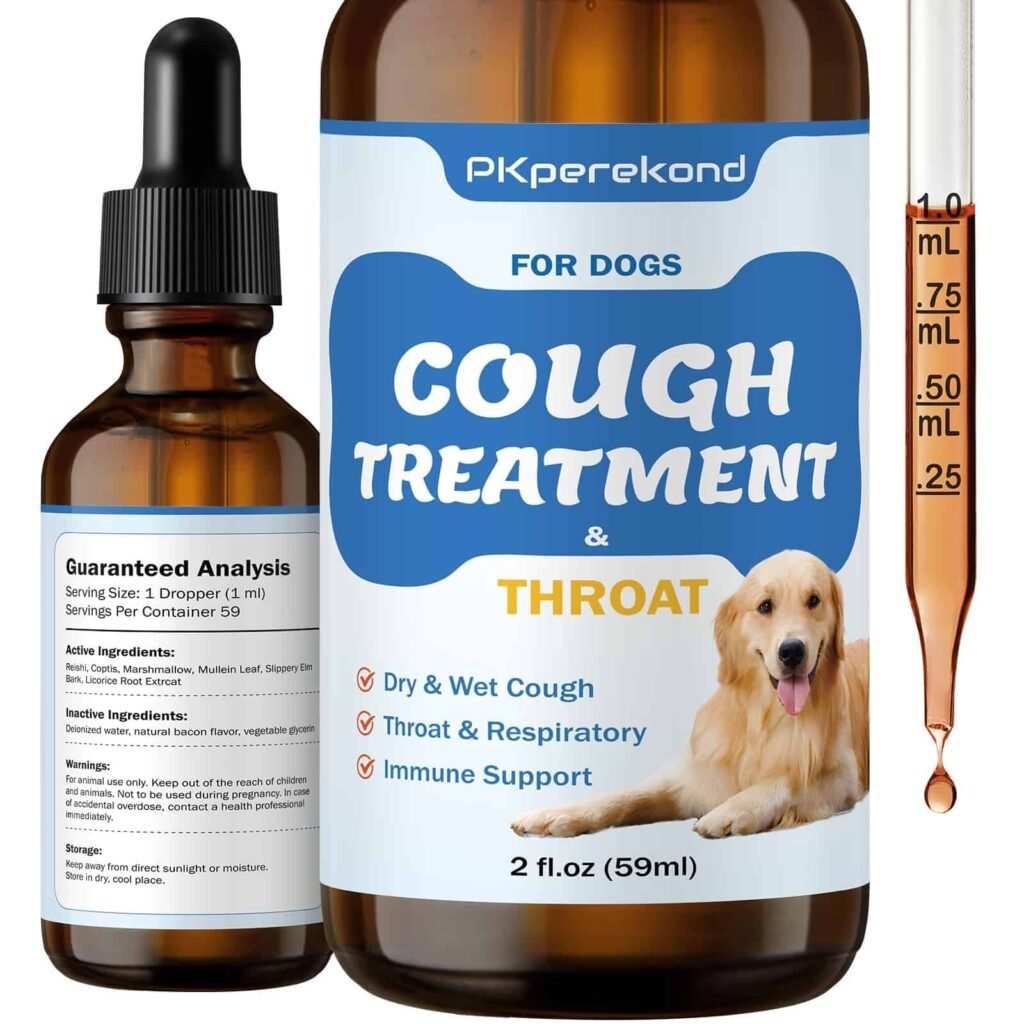
1. Proper Feeding Practices to Avoid Choking
Always feed your dog food that’s the right size and texture for their breed and age. Avoid giving cooked bones or complex objects. Supervised mealtimes and slow-feeder bowls can reduce choking risks and help your dog eat safely.
2. Maintaining a Clean and Allergen-Free Environment
Dust, smoke, and chemical cleaners can irritate your dog’s airways. Keep their space clean, vacuum regularly, and use pet-safe cleaning products. Reducing allergens helps prevent coughing and keeps your dog’s breathing comfortable at home.
3. Immunity Support
A strong immune system helps your dog fight off infections that cause coughing. Provide balanced nutrition, regular exercise, clean water, and up-to-date vaccinations.
Supplements or vet-approved probiotics may also give extra support, especially for aging or sensitive dogs.
When to Seek Help for Your Dog’s Cough?
You should call your vet if your dog’s cough is frequent, harsh, or paired with trouble breathing, low energy, or loss of appetite.
Coughing that lingers for more than a week also needs attention. Early checkups help rule out infections, heart disease, or other serious issues, ensuring your dog gets the proper care quickly.
Must Read: Can Dogs Eat Veggie Straws? – Tips and Safer Snack Options!
Home Remedies For Dog Cough And Cold
Give your dog plenty of clean water (or warm broth), rest, a humid environment (such as steam from a shower), and small amounts of honey (if an adult). Keep away from smoke, dust, and cold air. Watch for signs of worsening.
What Can I Give My Dog For Coughing And Gagging
Offer a teaspoon of honey (for adult dogs), warm broth, or water, and let them rest. Use a body harness (not a collar) to avoid neck pressure. If gagging or breathing trouble persists, seek veterinary attention promptly.
Kennel Cough Home Remedies
Let your dog rest, isolate from other dogs, use steam/humid air, and give a bit of honey. Keep them hydrated and use a mild diet. These support recovery but won’t replace veterinary care if it worsens.
Old Dog Cough Remedy
For older dogs, try warm fluids, soft food, a humidifier or steam, and honey (if safe)—gentle, short walks with a harness are also helpful. Avoid stress or cold drafts. Always vet check because older dogs may have heart or lung issues.
Dog Cough Syrup Recipe
Mix ½ to 1 teaspoon of pure honey with a little warm water or broth and let the dog lick it. Use only for adult dogs. This simple syrup soothes throat irritation—but don’t use it for long without vet advice.
My Dog Has A Dry Cough And Then Gags
This often means throat irritation or a tickle. Use humid air (steam), offer warm fluids, and try a little honey. Use a harness, not a collar. If gagging or coughing continues or worsens, take your dog to a vet quickly.
Home Remedies For Dog Cough And Cold At Night
At night, use a humidifier near their bed, keep the air clean (no smoke), offer warm broth, and give a bit of honey right before sleep. Make their bedding comfortable and quiet. Check a few times to see comfort and breathing.
FAQs
1. What Can I Give My Dog To Stop Coughing And Gagging?
Offer honey, steam therapy, and hydration to soothe coughing and gagging. Always check with your vet to ensure it’s safe for your dog’s condition.
2. What Human Medicine Can I Give My Dog For A Cough?
Only vet-approved medicines like diphenhydramine or cetirizine should be given. Never give human cough syrups without guidance, as some ingredients can be toxic to dogs.
3. What Home Remedy Can I Give My Dog To Stop Coughing?
Safe home remedies include raw honey, steam therapy, coconut oil, or warm chicken broth. These soothe the throat while keeping your dog comfortable and hydrated.
4. What Is A Natural Antibiotic For Dog Cough?
Echinacea and raw honey are natural options that may support your dog’s immune system. Still, always confirm safety and dosage with your vet before use.
5. Why Is My Dog Coughing Like Something Is Stuck In His Throat?
Irritation, kennel cough, allergies, or a foreign object may cause this. If coughing is severe or constant, seek veterinary care immediately for safety.
6. Can I treat kennel cough without a vet?
You can try mild care at home (rest, steam, honey), but if symptoms persist or worsen, see a vet fast.
7. Can I give my dog Benadryl for her cough?
Benadryl may help if the cough is allergy-based, but only use it under vet advice and the correct dose.
8. When should I worry about dog coughing?
Worry if the cough lasts for days, brings up mucus or blood, the dog loses its appetite, tires easily, or has trouble breathing.
9. How to make cough syrup for dogs?
Mix a small amount of pure honey with warm water or broth and let the dog lick. Use only for adult dogs.
10. Can honey soothe a dog’s cough?
Yes — honey coats the throat, eases irritation, and may reduce coughs. Use small doses; not for puppies.
Conclusion
Coughing in dogs can be simple or profound, so paying attention matters. Gentle home remedies like honey, steam, and rest may help mild cases, but never ignore warning signs. Call your vet if coughing is persistent, harsh, or paired with other symptoms. Acting early keeps your dog safe, comfortable, and healthy.
